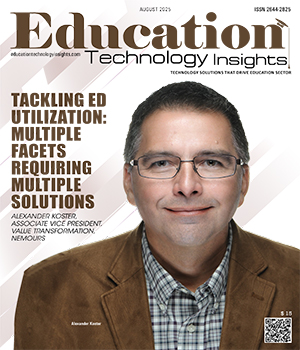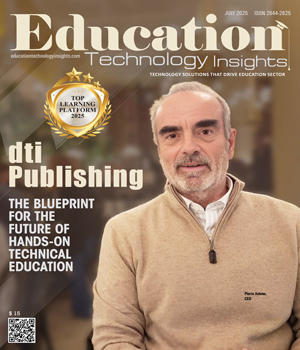THANK YOU FOR SUBSCRIBING
Be first to read the latest tech news, Industry Leader's Insights, and CIO interviews of medium and large enterprises exclusively from Education Technology Insights
Digital Literacies and the SHAPE of our Human Future
Dr Sarah Midford, Director of Learning and Teaching, School of Humanities and Social Sciences, La Trobe University
 Dr Sarah Midford, Director of Learning and Teaching, School of Humanities and Social Sciences, La Trobe University
Dr Sarah Midford, Director of Learning and Teaching, School of Humanities and Social Sciences, La Trobe UniversitySince the Covid-19 pandemic began, we have had to rapidly reconceptualize how we work, study, connect and socialize. As the worlds we inhabit becomes increasingly digital, the need for those who design these spaces to understand people and culture is becoming ever more important. In short, those who understand the academic disciplines of Humanities and Social Sciences (or SHAPE: Social Sciences, Humanities and the Arts for People and the Economy) are essential as humans move further and further into technological spaces and digital environments. Now is the time for universities to rethink what students learn in their degrees and how to ensure the most relevant literacies are taught to all graduates. To ensure graduates can comfortably inhabit digital spaces, digital literacies are key. However, it is important not to leave what makes us human behind upon entering ever more technologically dominated worlds. This means human, cultural, and ethical literacies are also essential for all graduates.
“It is not possible to design a viable future where humans and machines interact if we do not first bring together the disciplines that best understand humans and machines.”
Ensuring the machine and human worlds are comprehensible to the next generation will better prepare them for the future and lead to more equitable and sustainable futures that embrace technology but not at the expense of humanity.
Technology should be built by humans for humans
Science and technology exist to improve the lives of humans, so human knowledge, understanding, and perspectives must be at the heart of the development of any advanced technologies. Artificial Intelligence uses computers and machines to replicate human intelligence so that human productivity and the quality of human lives can be enhanced. However, it is not uncommon for technology to be designed and implemented without suitable ethical consideration, and this can and has led to inequity, deception, and vulnerabilities. Further, the ability to think deeply, critically, and ethically all at the same time is not something Artificial Intelligence has yet mastered, so the need for cultural and ethical literacies remains essential for those developing technology pursuing human replicability.
Developing Interdisciplinary Literacies
It is not possible to design a viable future where humans and machines interact if we do not first bring together the disciplines that best understand humans and machines. Those undertaking SHAPE studies at university are not customarily equipped with sophisticated digital literacies. They are, however, equipped with critical thinking and problem-solving skills, ethical reasoning, knowledge of human rights and responsibilities, an appreciation of the necessity for sustainable and equitable progress, as well as general comprehension of the past, present, and future of human culture, history, and society. Pairing this knowledge with digital literacies equips graduates with the tools they need to create a better human future. Having the opportunity to combine human and technological studies, such as Psychological Science and Cyber Security, Sociology and Computer Science, or History and Information Technology, facilitates interdisciplinary literacies central to effective technological design that seeks to improve human-machine interaction.
Interdisciplinary approaches to teaching SHAPE and STEM students have come about as part of a recent shift in thinking about the role humanities play in the development of technology. Government and industry reports are more frequently recommending collaboration between STEM and SHAPE disciplines and many universities are being funded to explore the future of humanity and technology through interdisciplinary research. For example, the Institute for Human-Centred Artificial Intelligence at Stanford University, the Future of Humanity Institute at Oxford University, and the Centre for the Future of Intelligence at Cambridge University all tackle big picture questions and problems concerned with the intersection between humanity and technology. They each aim to better understand humanity and its prospects, contribute to the informed development of machine intelligence, and enhance the human condition.
Multifaceted Graduates
Interdisciplinarity is at the center of innovation. It is no longer enough to teach university students one thing, and all graduates should be taught cross-disciplinary literacies. Central to mastering any literacy is students knowing how to access the information they need, the ability to contextualize and process that information, and then to communicate it onwards, often by transforming and recontextualizing it. The workplaces of the future will demand staff who can confidently draw on their multiple literacies to navigate digital and human spaces as the world changes around them.
There is a broad movement across the university sector to integrate STEM and SHAPE disciplines and cultivate relevant interdisciplinary literacies in their graduates. The next step is for business leaders to consider how they can best utilize interdisciplinary graduates in their organizations. It might be necessary to redesign positions so that digital, cultural, and ethical literacies become central requirements alongside more technical skills. Reskilling technologically focussed employees with SHAPE literacies will also be important. The reward will be a more holistic and better-informed approach to technological design and a more human-friendly digital world. This will ultimately contribute to shaping a prosperous digitally enhanced, but ultimately human future not only for the organization but for society more broadly. Focussing on building courses that shape multifaceted graduates with interdisciplinary capabilities, the skills to minimize the biases that have been so prevalent in technological developments to date, and who can act as agents for positive change, will lead to a more equitable and sustainable digital future for all.
Check Out This : Top Wastewater Management Solution Companies
Read Also
Putting Students First in a Global Classroom
Balancing Technology-Driven Teaching with Traditional Learning
Reflections on Vocational Education and Emerging Opportunities
Elevating Engaged Teaching in a Digital Era
Embedding Immersive Technologies within the Curriculum: Strategies for Sustainable Development
Aligning Innovation with Impact in Higher Education

I agree We use cookies on this website to enhance your user experience. By clicking any link on this page you are giving your consent for us to set cookies. More info













